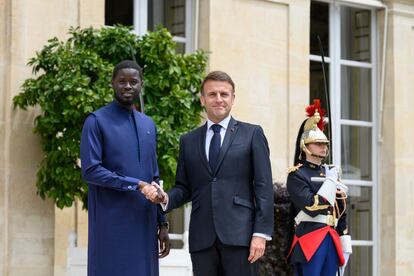On February 2, 2013, the then French president François Hollande was received as a liberator in the Malian cities of Bamako and Timbuktu, after a rapid military intervention led by Paris managed to dislodge the jihadists from the main cities in the north of the country. . Eleven years later, the before heroes Now they are expelled from Africa by a wave of sovereignty that, added to the emergence of new actors such as Russia, Turkey or China, aims to banish the enormous influence and French interventionism from the continent: of 10,000 soldiers present in Africa just five years ago, There are only about 4,000 left, and this is expected to be reduced to less than 2,000 in the coming months following recent announcements from Chad and Senegal.
This Tuesday, two French combat aircraft took off from the Adji Kossei base in Chad, heading to France. This is the first step in the departure of French troops from the country after, on November 28, the Chadian Government made public the breaking of the military agreement that protects the presence of a thousand French soldiers in its territory. That same day, the Senegalese president, Bassirou Diomaye Faye, advocated the closure of the only French military base in his country.
They are the last pieces of a domino that, according to Dagauh Komenan, doctor in Contemporary History and specialist in the Sahel, began to fall in 2017. “Sometimes we forget that the Central African Republic was the first link. “France decides to end Operation Sangaris and Russia takes advantage of that vacuum to inaugurate its new doctrine in Africa with the private company Wagner and control of the minerals,” he says.
The French military presence dates back to the years immediately after independence. Many regimes in African countries that had been French colonies signed agreements with the former metropolis to guarantee their survival in the face of opponents, rebels and coups d’état. With barely 10,000 troops spread across a handful of countries, it was enough for France to intervene militarily on up to 30 occasions between 1964 and 2012, the golden age of that complex network of relations marked by neocolonial interference called Françafrique,during which Paris managed to maintain its influence on the continent. But times have changed.
At the end of the nineties, the musician from reggae Ivorian Alpha Blondy was already singing openly: “French army, leave. Stay away from us. “We no longer want independence under close surveillance.” A new generation of citizens was emerging throughout the continent that demanded a deeper understanding of sovereignty and that today has crystallized into political and social movements. “The abnormality represented by France’s paternalistic relationship with its former colonies has been placed at the center of the debate,” says Jesús Pérez Triana, coordinator of the analysis website Osint Sahel, “we are in a moment of paradigm change, not only in the military, also economically.”
Of those 10,000 soldiers, more than half deployed in the Sahel with Operation Barkhane, today there are about 4,000 left. The main French base, with 1,500 troops, is located in Djibouti, a strategic logistics and operational platform that overlooks a key maritime route in world trade and from where it is possible to intervene in a short time not only in Africa, but in the Middle East. and the Indian Ocean. Behind it, the most robust presence is in Chad, with a thousand troops, the last bastion of its action in the Sahel after its forced departure from Mali, Niger and Burkina Faso, where they have been replaced by Russian soldiers and mercenaries. In fact, the breach of the military agreement made public by N’Djamena took Paris by surprise.
“On October 28, Boko Haram attacked a military base in the Lake Chad area and killed around 40 soldiers. The army launched a response, but did not gain support from France. “They felt like they had been left alone,” says Komenan. For Pérez Triana, Chadian President Mahamat Idris Déby is more interested in acquiring war material from Turkey, China or Russia, such as state-of-the-art drones, than maintaining a military cooperation model that does not contribute to his fight against terrorism. “France is not on the front line against jihad in Chad because this has a high internal political cost, it no longer brings any revenue,” explains the expert.
After their expulsion from Mali, Burkina Faso and Niger between 2021 and 2024 by the new military junta, motivated largely by the failure of Operation Barkhane against an increasingly widespread jihadism, and in the midst of the growing wave of sovereignty that travels through Africa, France itself had undertaken a plan to reduce its troops on the continent. At the end of November, French Foreign Minister Jean-Marie Bockel delivered a plan to President Emmanuel Macron detailing the reconfiguration of its military apparatus.
The mission in Djibouti, intact
Although the official figures have not been released because they are classified information, different French media outlets reported during the summer that the number was intended to be reduced by half, going from around 4,000 to around 2,000. Only the Djibouti base would remain intact. “They intended to show that they were leaving, not that they were being kicked out,” says Pérez Triana. But Chad and Senegal’s announcement “has been a blow to their national pride and international prestige,” Komenan concludes.

In Dakar, President Faye’s decision to close the Ouakam base will affect some 350 soldiers. However, its impact is more symbolic than operational. Senegal has always been a firm ally, but the arrival to power of Pastef, a party that has championed its sovereignty and pan-Africanist discourse, suggested a decision in this regard. With his departure, the 100 French soldiers stationed in the Ivory Coast (currently there are 600, but Paris plans a reduction) will be the only ones left in West Africa. The debate about their presence in this territory will not take long to spread, especially in view of the 2025 elections. Finally, about 350 troops remain in Gabon, which the Elysée wants to leave at around one hundred.
“Despite him, Macron’s name will go down in history, among other things, for being the one who let French influence go in Africa,” says Komenan. “Not only are Africans rethinking France’s role, but the French are rethinking their neocolonial logic. It is a change in the balance of forces. The African armies of the eighties and nineties were fed by French material, doctrine and even aesthetics, but now there are other sources of supply, a market in which Paris is not. The feeling that the French military presence is unaffordable also comes from there,” Pérez Triana emphasizes.







